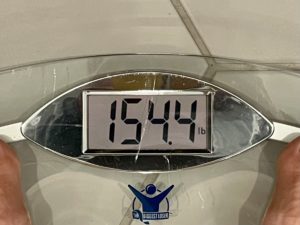If you caught my Instagram or Facebook posts yesterday, you already know that I traveled to and from New York City on February 25 to get my brain scanned as a participant in the Women’s Brain Initiative clinical trial at Cornell.

Unfortunately, the trip was for naught because their camera broke that day so I couldn’t get the scan. Meaning: I traveled all the way to and from NYC for nothing. I was pretty frustrated, as you might imagine, but at least I had the down time to finally watch Encanto (plus lots of fascinating bonus materials) on my iPad! 😊
I had already gotten an MRI and a regular PET scan done for the Women’s Brain Initiative study last summer, but at that time their amyloid scanner was down because they didn’t have the radioactive tracer needed (yes, it has happened to me twice now), so they had to reschedule it for me. Unfortunately, they don’t disclose the results of the amyloid PET scans to participants of the study, because it’s currently unclear what the clinical significance is: there are people running around with amyloid plaques in their brains who have normal cognitive function, and there are people running around with dementia who have no amyloid plaques in their brains. Of course, having amyloidosis in the brain is thought to be a harbinger of cognitive changes to come, which is why *I* am so interested: if I have amyloid plaques seen in my brain right now, it’s extremely likely that I will develop overt Alzheimer’s (even more likely than my family history and my APOE4 carrier status already portend) — and I might finally freak out enough to actually stop eating sugar (one of the only things I am NOT currently doing well in my Alzheimer’s prevention efforts). I can’t receive the results of my own amyloid PET scan from the study, but as a patient of Dr. Richard Isaacson at the Weill Cornell Alzheimer’s Prevention Clinic, my hope is that if I eventually get the scan done, I may be able to learn the results from his team when I follow up with them. I must say, the out of pocket costs for an amyloid PET scan of the brain can be about $3,000-$5,000, so it may be worth my pain with scheduling and rescheduling!
Amyloid PET scans are specialized scans of the brain that use a specific radioactive tracer to tag beta-amyloid protein. The tracer emits positrons as it decays, and they take pictures of the positrons that are emitted by the tracer. These scans have only been around for about 20 years, and have only recently became more widely available. Before now, the confirmation of amyloid plaques in the brain (the hallmark of Alzheimer’s type dementia) could only be obtained by autopsy after the patient had died. Today, new technologies such as amyloid PET scan of the brain and indirect proxies for brain amyloid such as amyloid retinal imaging (still not widely available) and the measurement of specific amyloid levels in the blood (PrecivityAD — here is a Scientific American article about it) are becoming available. Dr. Isaacson asked me to get the PrecivityAD test done last year, for which I shelled out $1,250. My age is younger than the target population for the test so it’s hard to interpret my results, but my results came back saying I had a very low chance of having amyloid plaques in my brain. Dr. Isaacson told me it was the lowest level he had ever seen. (But again, it’s intended for people age 60 and older, and I was 47 when I had mine done!). This blood test is not currently covered by insurance, but the company states that they have a financial assistance program and payment plans available for people who qualify. Also, regular PET scans are covered by many insurance plans for people with cognitive changes, and the lack of glucose uptake on a regular PET scan is correlated with the presence of amyloid plaques, so this more widely available scan is an option for many people today even outside of clinical trials. My mom’s Alzheimer’s diagnosis was confirmed with an MRI and a regular PET scan, and both scans were totally covered by Medicare.
I still hope to get my amyloid PET scan done at some point and hopefully be disclosed the results when I follow up with Dr. Isaacson, but even if I don’t, it’s honestly a privilege to participate as a subject in such ground breaking research. If I am not able to prevent Alzheimer’s disease in myself, at least maybe my participation in this study can help future generations of my family — clinical research is critical in the fight against this devastating disease. The Women’s Brain Initiative clinical trial is currently enrolling “women and men of age 40-65 years, with a family history of Alzheimer’s, and no cognitive impairment or dementia.” If you or someone you love is interested in participating as a subject in the Women’s Brain Initiative, you can email the research coordinators at [email protected] to inquire more about the study!
…And in other news, my Project 135 weight is up a bit this week as predicted, as last week’s weight was taken after my fasting mimicking diet when my body was still lacking glycogen and water (and poop) weight! But overall I’m exceedingly pleased to be down 10 pounds since New Year’s! And I haven’t given up sugar and flour entirely yet — I’ve just been eating less of it than before. I know if and when I’m ready to commit to avoiding it, I’ll have a much better shot at hitting my goal weight of 135 one day….
Project 135 (resurrected) stats:
week 0 (Jan 1, 2022): 164.4 lbs

week 1: 162.2
week 2: 160.8
week 3: 159.2
week 4: 159.4
week 5: 156.4
week 6: 157.2
week 7 (after FMD): 153.4
week 8: 154.4
Total weight loss: 10 lbs (6.1%)
Until next week, stay well! ❤️

